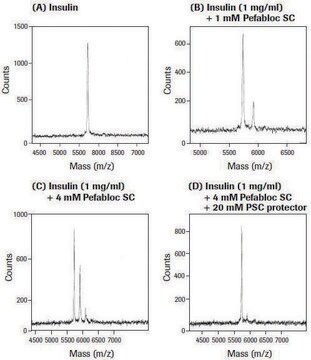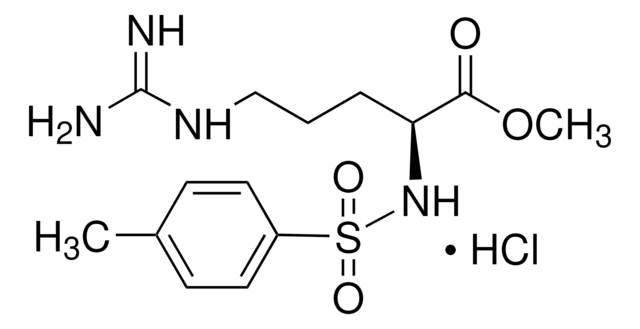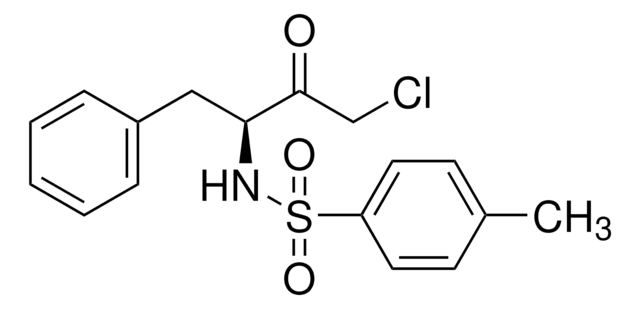추천 제품
형태
crystalline
Quality Level
분자량
239.5
포장
pkg of 5 mL (100 mg)
제조업체/상표
Roche
농도
0.1-1.0 mg/mL
기술
blocking: suitable
protein purification: suitable
최적 pH
neutral
mp
175-185 °C
solubility
soluble (Solubility and stability of the protease inhibitor remains unchanged.)
저장 온도
2-8°C
일반 설명
Pefabloc SC is a specific, potent, and irreversible inhibitor of serine proteases. The inhibitory activity is comparable to PMSF or DFP, but Pefabloc SC is nontoxic to cells. The Pefabloc SC PLUS set combines the serine protease inhibitor Pefabloc SC with a uniquely formulated Pefabloc SC protector (PSC-Protector), adding additional convenience and reliability to the safe, stable protease inhibition provided by Pefabloc SC.
Recent findings indicate that sulfonyl-type serine protease inhibitors such as Pefabloc SC and PMSF can bind covalently to proteins. This can occur when the inhibitors are used in high concentrations, or during extended incubation times under alkaline conditions. This interaction adversely affects the tyrosine and lysine residues of a protein, as well as the free amino terminus. The PLUS additive (PSC-Protector) included with this set prevents covalent attachment of Pefabloc SC to proteins when used in higher concentrations and extended incubation times at an alkaline pH.
Recent findings indicate that sulfonyl-type serine protease inhibitors such as Pefabloc SC and PMSF can bind covalently to proteins. This can occur when the inhibitors are used in high concentrations, or during extended incubation times under alkaline conditions. This interaction adversely affects the tyrosine and lysine residues of a protein, as well as the free amino terminus. The PLUS additive (PSC-Protector) included with this set prevents covalent attachment of Pefabloc SC to proteins when used in higher concentrations and extended incubation times at an alkaline pH.
특이성
Pefabloc SC belongs to the family of sulfonyl fluorides which irreversibly block serine proteases. Pefabloc was also described as potent serine threonine phosphatase inhibitor.
Specific, potent, and irreversible inhibitor of serine proteases. The inhibitory activity of Pefabloc SC is comparable to PMSF or DFP; however, Pefabloc SC is non-toxic. Specifically inhibits serine proteases and prevents nonspecific covalent modification of proteins as tested by mass spectrometry.
애플리케이션
- Pefabloc® SC is used to inhibit the detrimental effects of proteases during preparative protein purification. The PSC-protector solution prevents nonspecific covalent modification of proteins when Pefabloc is used in higher concentrations and extended incubation times at an alkaline pH (tested by mass spectrometry).
- Due to its low toxicity toward eukaryotic cells, it may be applied in the production of recombinant proteins, during fermentation of transformed cells, where proteolytic digestion may decrease the yield of the desired product.
- Pefabloc SC is used to completely inactivate proteinase K during the preparation of chromosomal DNA in agarose plugs. For this purpose, the cells are embedded in agarose and digested with proteinase K to degrade all proteins. Before a specific restriction endonuclease is added, the proteinase K is inactivated by incubating the agarose plugs in 1 – 5 mM Pefabloc SC in 10 mM Tris-HCl, 1 mM EDTA , pH 7 for 2 hours at +37 °C or overnight.
- In contrast to PMSF, Pefabloc SC is an excellent blocker of thrombin activity in serum or plasma. In these biological fluids, PMSF interacts in a reversible manner with albumin, which reduces its free concentration and leads to a delay in thrombin inactivation. Pefabloc SC, however, does not react with serum albumin, and exhibits a threefold higher capacity to inactivate thrombin under similar conditions.
- Pefabloc SC can be used on living cells.
Pefabloc® SC PLUS has been used in digitonin extraction buffer and in cathepsin B activity assay buffer in THP-1 cells. It has also been used as a component of iodixanol solution and sucrose buffer for the isolation of nuclei from Xenopus embryos.
특징 및 장점
- Take advantage of a simplified two-reagent system. Use the PSC-Protector solution to prevent covalent binding between proteins and Pefabloc SC, even at high concentrations, extended incubation times, and at alkaline pH.
- Benefit from an easy-to-use inhibitor. Add water-soluble Pefabloc SC directly to aqueous buffers.
- Avoid hazardous compounds. Obtain non-toxic protease inhibition without risk to you, or those around you.
- Ensure protection with improved stability. Achieve consistent protease inhibition even at pH levels above 7.0 and temperatures above +4°C.
- Maximize inhibition. Be certain that your levels of active inhibitor are high enough by using a product that is reliably soluble and stable.
포장
Set containing two components
제조 메모
Working concentration: 0.1 - 1.0 mg/ml (0.4 - 4 mM)
Pefabloc SC plus the corresponding amount of PSC-protector
Working solution: Recommended solvent is distilled water or aqueous buffer (for Pefabloc SC).
The solubility is up to 0.1 M for Pefabloc SC.
Storage conditions (working solution): -15 to -25 °C (stock solution)
Solubility and stability of the protease inhibitor remains unchanged. See Pefabloc SC.
Pefabloc SC plus the corresponding amount of PSC-protector
Working solution: Recommended solvent is distilled water or aqueous buffer (for Pefabloc SC).
The solubility is up to 0.1 M for Pefabloc SC.
Storage conditions (working solution): -15 to -25 °C (stock solution)
Solubility and stability of the protease inhibitor remains unchanged. See Pefabloc SC.
재구성
Solubility and stability of the protease inhibitor remains unchanged. See Pefabloc SC.
기타 정보
For life science research only. Not for use in diagnostic procedures.
법적 정보
Pefabloc is a registered trademark of Pentapharm
키트 구성품 전용
제품 번호
설명
- Pefabloc SC, 100 mg
- PSC-Protector solution, 5 mL ready-to-use
신호어
Danger
유해 및 위험 성명서
Hazard Classifications
Eye Dam. 1 - Flam. Liq. 3 - Skin Corr. 1B
Storage Class Code
3 - Flammable liquids
WGK
WGK 1
시험 성적서(COA)
제품의 로트/배치 번호를 입력하여 시험 성적서(COA)을 검색하십시오. 로트 및 배치 번호는 제품 라벨에 있는 ‘로트’ 또는 ‘배치’라는 용어 뒤에서 찾을 수 있습니다.
이미 열람한 고객
Chikodili C Nduaguibe et al.
Islets, 2(3), 200-206 (2010-11-26)
Pefabloc, Trasylol and Urinary Trypsin Inhibitor (UTI) have been reported to be effective serine protease inhibitors that impair pancreatic endogenous proteases resulting in improved islet yield. Here we evaluated the effect of these inhibitors on endogenous proteases (trypsin, chymotrypsin and
Vikte Lionikaite et al.
Journal of leukocyte biology, 104(6), 1133-1145 (2018-07-31)
Increased intake of vitamin A (retinoids) is associated with decreased bone mass and increased fracture risk in humans. Mechanistic studies in rodents have shown that hypervitaminosis A results in decreased bone mass caused by an increase in periosteal osteoclasts while
Yonggang Zhang et al.
Oncotarget, 6(8), 6160-6178 (2015-02-24)
Regulatory mechanisms underlying constitutive and inducible NFκB activation in cancer remain largely unknown. Here we investigated whether a novel NIK- and IKK2-binding protein (NIBP) is required for maintaining malignancy of cancer cells in an NFκB-dependent manner. Real-time polymerase chain reaction
DNase-seq to study chromatin accessibility in early Xenopus tropicalis embryos
Cho JS, et al.
Cold Spring Harbor Protocols, 4 (2019)
Aaron J Ogden et al.
International journal of molecular sciences, 21(12) (2020-06-27)
Drought is the leading cause of agricultural yield loss among all abiotic stresses, and the link between water deficit and phloem protein contents is relatively unexplored. Here we collected phloem exudates from Solanum lycopersicum leaves during periods of drought stress
자사의 과학자팀은 생명 과학, 재료 과학, 화학 합성, 크로마토그래피, 분석 및 기타 많은 영역을 포함한 모든 과학 분야에 경험이 있습니다..
고객지원팀으로 연락바랍니다.











